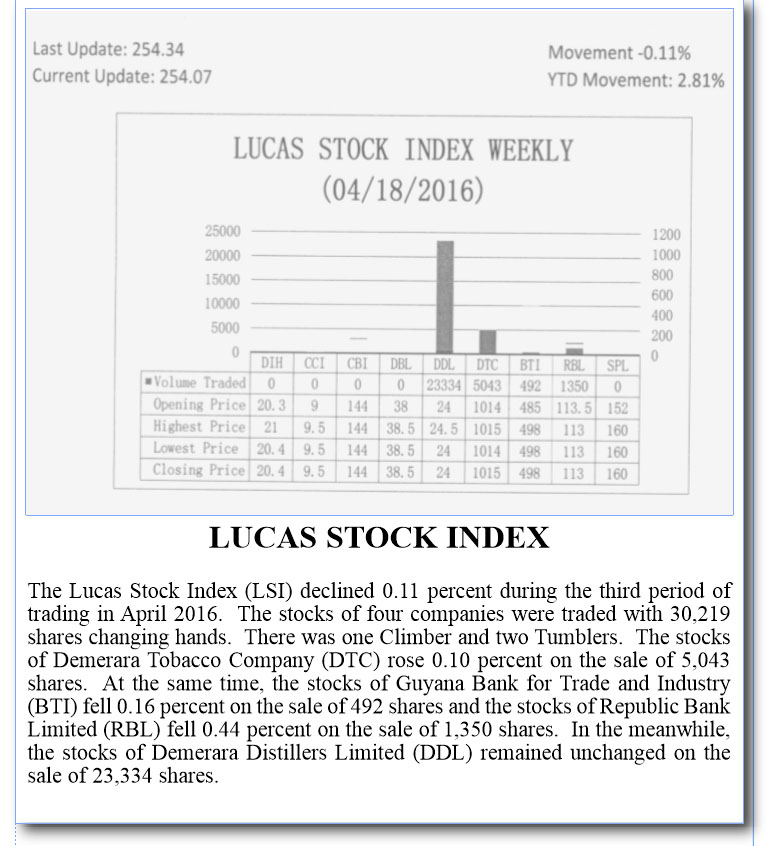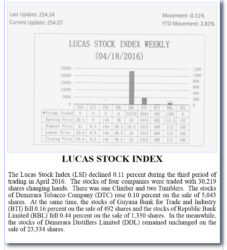Missed opportunity
The Guyana economy grew by an average of 5 percent over the last seven years but questions remain about the distribution of the wealth. Questions also remain about the opportunities for equitable participation in the procurement activities of the country. On 23rd December 2013, the United Nations adopted resolution 68/237 declaring the period 1 January 2015 to 31 December 2024 as the International Decade for People of African Descent. The proclamation that created the observance of the Decade was followed by the adoption of a programme of action in 2014. The global community agreed to the programme unanimously just before the launch of the Decade and identified actions that countries needed to take to bring about meaningful changes in the social and economic conditions of people of African descent. Despite the racial make-up of the country, Guyana does not escape the responsibility of making the lives of people of African descent in this country better.

Indeed, the Decade was launched last year, but may have gone unnoticed because the political events at the time in Guyana might have overshadowed the occasion. The Parliament had been suspended and the country was gripped with political uncertainty. A decision about whether and when to hold elections occupied the minds of Guyanese more at the time than the launch of the Decade. Guyana therefore would have missed the opportunity to acknowledge the Decade and to assess the implications of its launch for national cohesion and national economic development. One did hear the current President of the Co-operative Republic of Guyana address a gathering on the issue early last year. The observance of the Decade is in its second year and one still gets the feeling that the public remains unaware of its existence and has not come to grips with its meaning for the current and future economic development of the country.
Policy ideas
Before addressing the economic focus, it would be useful to examine the policy ideas contained in the document. The resolution proclaiming the decade contained many policy ideas, but two of them are policy issues of national significance. Those are security and liberty. Most policymakers and practitioners agree that one of the most important functions of government is keeping the people within its boundaries safe. The resolution that proclaimed the Decade recognized that racism was at the heart of the security problems that most people of African descent encountered as victims. It observed that millions of human beings were victims of racism, racial discrimination, xenophobia, and related intolerance. People of African descent also encountered structural and institutional discrimination and are often victims of police violence. Guyana has been working to overcome these problems and its commitment to safety covers everyone. It covers citizens, foreign workers and visitors to the country. It is therefore important that the issue of security receives high attention in any dialogue about implementing the actionable parts of the decision.
Further, a conversation about the Decade could be guided by the various facets of the theory of liberalism. Liberalism embraces the values of liberty, equality, democratic government and the rule of law. The economic outlook for Guyana is good, but could be much stronger if the many parts of its productive system could work simultaneously. It is part of what the resolution recommends with respect to action that is required at the national level. There must also be the opportunity to expand free trade and to do so in products that increase the welfare benefits of producers. Guyana must take a look to ensure that its economic policies are working for all stakeholders in the context of the goals of the Decade.
Specific context
Undoubtedly, the provisions of the resolution have to be put in the specific context of each country for not all elements of the programme of action would be relevant to Guyana’s economic circumstances. It would have to take account of tax policy, monetary policy and fiscal objectives and budgetary constraints. The constraints imposed by inadequate or unreliable infrastructure become obstacles that must be solved. Implementation of the programme developed by Guyana would require ingenuity, dialogue and bold decisions thereafter. It would be important to understand that whatever Guyana does must acknowledge the economic inequality that exists between people of African descent and others if success is to be possible.
Liberalism also harbours the concept of economic freedom. The environment in which business takes place must be friendly and easy to operate. Economic activity must support the growth of the economy and the increase in the wealth and welfare of the people of Guyana. For economic freedom to take hold, people must enjoy equality of opportunity to participate in the national economy. People must also be able to celebrate their diversity. The celebration of the Decade must see positive changes to the environment in which people of African descent operate.
Centrepiece
The centrepiece of the Decade is the programme of action which serves as a basis on which States and international organizations can pursue certain objectives. This programme has far-reaching consequences for resource allocation not only within countries, but also between countries since it envisages a special role for international cooperation. It anticipates increases in cross-border financial flows in support of poverty eradication programmes and the use of economic mechanisms that make it easier for people of African descent to lift themselves out of poverty.
Education and economic progress
Successful economic activity comes from education and the strategic use of information. In production terms, this is known as the knowledge structure. The programme of action recognizes the vital nexus between education and economic progress and encourages governments to ensure that marginalized communities receive adequate attention and support to help improve the quality of education, among other things. There is the need therefore to encourage more foreign investment and to acquire foreign financial support for better schools that are equipped with good science laboratories that could make learning and discovery fun for all Guyanese, but especially those of African descent. Everyone wants to see change and improvement in the quality of life of all Guyanese.
Under the area of development, the programme of action calls for a variety of measures. A very important element was recognizing that poverty was both a cause and a consequence of discrimination. This is vital to the efforts being made to reduce poverty. Guyana would have made progress towards eradicating poverty, but much more is needed to get people off of the dams and out of the slums. The programme of action urges the country to consider the use of workable tools to reduce social exclusion. The wider thrust towards the eradication of poverty is required to take account of the specific needs and experiences of people of African descent. The move towards economic development should also expand efforts at regional and global cooperation to support implementation of the various programmes that are ultimately developed in support of economic progress.
The journey
The journey to the launch of the Decade was not an easy one. The origins could be traced to the decision of the UN General Assembly in 1997 to host the World Conference on Racism, Racial Discrimination, Xenophobia and Related Intolerance. This conference took place in Durban, South Africa in 2001, but was plagued with serious political problems that resulted in Israel and the United States of America refusing to participate. Several other countries distanced themselves from the activities in Durban. The start of the process even claimed the job of a high-profile international civil servant.
However, subsequent efforts enabled the wider international community to eventually come together to agree on proclaiming the Decade. Much effort and thought went into the decision to dedicate a concentrated period of time to issues of racism and racial discrimination that appear to be routine behaviour towards people of African descent. The many resolutions that were cited in the final document are in themselves proof that the issue has been studied intensely. Guyana has eight and a half years left to fulfil the various mandates of the programme of action.
Change their lot in life
One could only hope that, once the celebration of the principal events of the 50th anniversary of independence is over, the country will avail itself of the opportunity to focus on the Decade and to formulate the economic and social programmes that are vital for its success. The international community has spent an inordinate amount of time working towards the adoption of the Decade. The people of this country should too and show respect for the efforts that the world has made to enable the people of African descent to change their lot in life.






